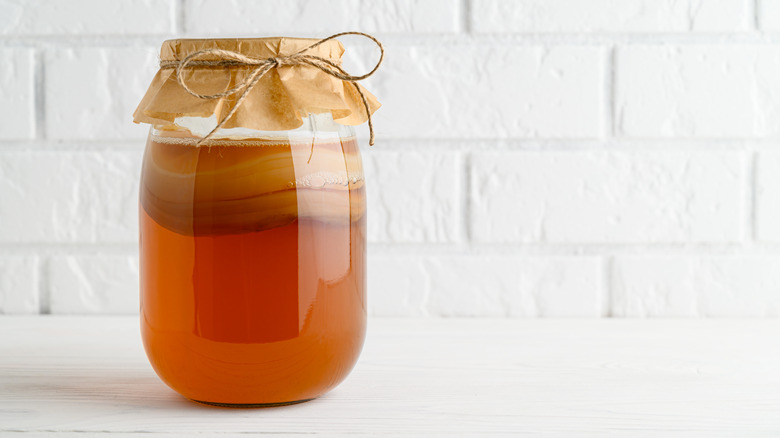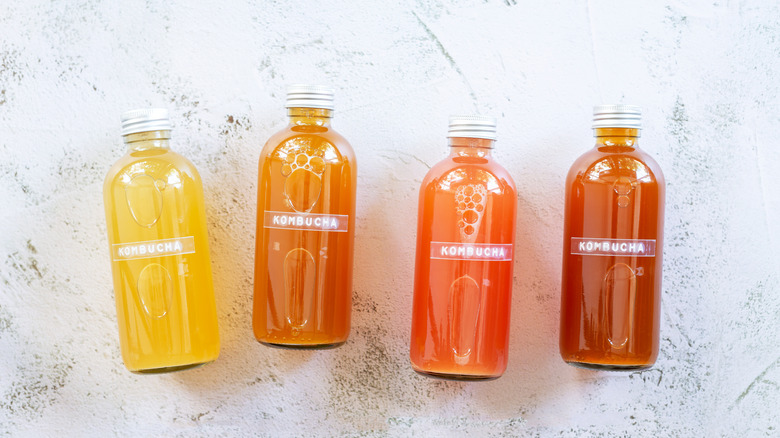Here's What Happens When You Drink Too Much Kombucha
By now you've most likely come across kombucha, whether in the supermarket where it's packaged in colorful bottles with enticing names, or maybe a friend excitedly showed you their scoby. Time explains that kombucha is a fizzy carbonated natural drink using black or green tea as the base, accompanied by sugar and a colony of live organisms known as scoby (symbiotic colony of bacteria and yeast). After some time, with the live cultures inside, the drink begins to ferment and carbon dioxide builds up, resulting in a quasi tea soda that's slightly sweet and tangy.
While the mainstream kombucha market seems to have exploded in the past decade, the beverage actually originated in China more than 2,000 years ago according to Time. The drink is hailed for its impressive amount of probiotic bacteria, but actual studies on its effects on the human gut biome are few and far between according to Dr. Zhaoping Li, a professor of medicine at UCLA who spoke to the magazine about possible health benefits of the drink. Dr. Li also specifies that not everyone tolerates live bacteria, and it sometimes can be harmful, particularly for women during pregnancy or who are breastfeeding, or people with immunocompromised conditions.
MyRecipes explains that modern facilities producing kombucha are regulated, sterilized, and generally have minimal issues regarding the safety of bacterial colonies. But with a rise in enthusiastic DIY brewers, the beverage is increasingly made in homes. While it is definitely a great way to save money and customize the drink, it can be much harder to control the quality of the bacteria when equipment sterilization and temperature are not monitored appropriately and you could actually get food poisoning (via MyRecipes). In two cases, the CDC noted severe illness, including one death. As the report notes, the two individuals had been drinking kombucha daily for two months. So how much is too much?
Kombucha is best consumed in moderation
Though you probably won't die from drinking too much kombucha — the CDC case is a very rare example — the truth is that the drink may not be as much of an elixir as it's marketed to be. And drinking too much of it may not be the best for your body.
As mentioned, very little research exists to confirm all of kombucha's purported benefits (via Time). Furthermore, the drink contains fluctuating levels of sugar, and in some cases can have up to 28 grams, approaching the sugar content in soda (via Healthline). Registered dietitian Elizabeth Boham, MD further tells Well and Good that the sugars found in kombucha are absorbed quickly by the body, causing an insulin spike which over time may lead to inflammation, disease, and weight gain. She recommends sticking to less than five grams of added sugar per serving and less than 20 calories per serving, since all that sugar can also lead to excess calories.
Healthline notes that bloat and digestive discomfort can also be experienced from too much kombucha due to the excess carbon dioxide that sits in the gut and the presence of FODMAPs (carbohydrate compounds that aren't easily digested, particularly for those with IBS). As a fermented tea beverage, kombucha also contains caffeine and alcohol, albeit in small quantities (via Time). The drink is also high in acid, which Everyday Health points out can lead to lactic acidosis, an accumulation of acid in the body with a number of complications. Less alarming but still problematic is the fact that the high acidity can cause tooth enamel damage and discoloration, though drinking through a straw can help counter these effects (via Time).
While kombucha might not be the magic potion of health and youth, enjoying it in moderation can still have its benefits.

